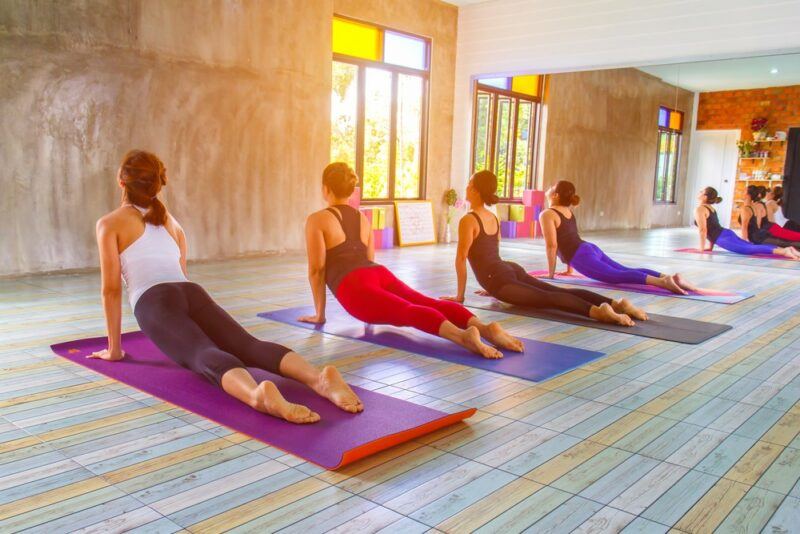
Hot yoga has been taking the health industry by storm. It is now one of the most popular forms of yoga, one that’s meant to offer even more benefits than regular yoga. This is impressive, given that yoga itself is thought to help in many ways, offering improvements to your mental health, physical health, sleep quality, stress levels, and more. But is hot yoga good for you?
Regular yoga involves a combination of physical poses and breathing techniques. Hot yoga is almost exactly the same, except that you’re practicing in a much hotter room. Sometimes the temperature is around 80°F, while other times you’re looking at 100°F or even above.
The high temperatures are meant to be a good thing, especially when you’re working on physical health. They should, in theory, help to improve your flexibility still further and even increase how many calories you burn. But, still, is hot yoga good for you?
While the simple answer to that question is yes, there’s more to it than just that. After all, many practices are healthy in some situations and not at all in others. Even running can put you at risk. Similarly, practices like intermittent fasting aren’t helpful for everyone.
Hot yoga does have some benefits, but there are also some notable risks. Being aware of these before you start hot yoga can help you to protect yourself and get the most out of the experience.
Is Hot Yoga Good For You?
- An Introduction To Yoga And Hot Yoga
- Is Hot Yoga The Same As Bikram Yoga?
- Potential Benefits Of Hot Yoga
- Risks Of The Practice
- Yoga Vs. Hot Yoga – Which Is Better?
- Does Hot Yoga Help You To Detox?
- Final Thoughts
An Introduction To Yoga And Hot Yoga

The word yoga refers to union. Specifically, the union of your mind, body, and spirit, making yoga an exercise that may promote both physical and mental wellbeing. The practice involves physical poses that you may be holding for short periods or at length, along with breathwork.
There are multiple disciplines of yoga, with their own specific techniques. Hatha yoga, for example, focuses on the body and the mind, while Jnana yoga has a wisdom focus instead.
Of course, the yoga you see today tends to be quite different than these ancient forms. Classes often practice a westernized version of yoga instead, one that takes some elements of the original tradition, but not all of them.
For one thing, western versions of yoga have a much greater focus on physical fitness. Some maintain the emotional and spiritual connection as well, while others drop this out almost entirely. Similarly, the focus on breathwork varies from class to class.
Is Hot Yoga The Same As Bikram Yoga?
You’ll sometimes hear the term Bikram yoga used instead of hot yoga, but the two practices aren’t exactly the same. Bikram yoga is a very specific practice, where the same two breathing exercises and 26 poses are practiced in the same order each time. The temperature and humidity are precise as well and are always the same from one class to the next.
Hot yoga, on the other hand, is simply a yoga session conducted in a hot room. The temperature is based on the instructor’s preference, so some sessions will be much hotter than others. You may also find versions of hot yoga that are held with music pumping and others that focus on calmness and being contemplative instead.
The benefits of hot yoga and Bikram yoga are much the same, as you’re still doing similar stretches in a hot room.
However, it’s worth reading the description of the class before you begin. This way you know what you’re getting into and whether it matches your needs. After all, if you’re looking for a meditative experience, a loud sweaty version of hot yoga would be incredibly disappointing.
Potential Benefits Of Hot Yoga
Improves Your Flexibility
Yoga is powerful for improving your flexibility. No surprises there, as the practice does involve slow stretches and holding your body in poses that you’d never normally be in. Many people find that they struggle with some yoga poses when they first begin, then begin to improve the more time they spend practicing them.
There has been some research into this area as well, with studies showing that yoga helps flexibility just as much as stretching-strengthening exercises. Less is known about the flexibility effects of hot yoga, but one Bikram yoga study did find improvements to flexibility and other health outcomes.
Increases Strength Too

While yoga is most often associated with flexibility, it can help you get stronger too. The process is more gradual and less powerful than lifting weights, but you’ll still find that your body strength increases over time, especially as you practice more challenging poses.
Decreases Your Stress
The link between yoga and decreased stress makes sense. Practicing yoga involves slowing down, spending time focusing on your breath and your body, and getting away from all the worries of the day. This effect alone is powerful for helping to shake off stress.
Plus, many of us live hectic lives, where there is almost always something to worry about. We might not have many places where we can slow down and be calm, which makes yoga especially valuable.
Improves Sleep
The effect of lowering your stress impacts your health in other ways too, including making it easier to sleep. This doesn’t mean that you need to practice yoga right before bed. Instead, people who practice yoga regularly seem to sleep better.
Some studies have even found this effect for Bikram yoga specifically, showing that young adults who practice yoga regularly returned to sleep after waking at night faster.
Research in this field is still in its early phases, so we don’t know whether hot yoga helps everyone with sleep or just some people. Similarly, the effects on people with insomnia aren’t well understood.
Still, hot yoga isn’t likely to harm your ability to sleep. It also offers plenty of benefits, so it could be worth experimenting with for yourself.
A Low Impact Way To Exercise
Yoga is a fantastic way to improve fitness. Not only are you working on your flexibility and strength, but you’re also doing so in a low impact way. This is powerful for anyone who struggles with joint pain or any other issue that makes high impact activities difficult.
Most yoga poses can be modified as well to vary their intensity. Yoga instructors often provide details for multiple intensity levels and can instruct individuals on adaptations that meet their physical needs.
You can also lose weight with yoga and perhaps even more so with hot yoga. After all, your body needs to respond to the heat of the room, as well as the exercise that you’re doing.
Can Help Your Bones
Hot yoga involves much more sweating than regular yoga, which sounds like it could be a bad thing. Some researchers have been concerned about exactly this issue, thinking that sweating would disrupt calcium systems in our bodies, leading to a decrease in bone density.
Studies, however, have found the opposite effect, where people participating in hot yoga lost a decent amount of sodium through sweat, but relatively little calcium. This result means that hot yoga ends up helping your bones, rather than being bad for them.
Can Improve Mental Health

Yoga promotes the idea of mindfulness, which has been linked to many mental health benefits. Indeed, yoga is thought to be a powerful tool for the treatment of depression and anxiety, partly because of its calming nature.
Hot yoga might be even better at this effect than regular yoga, as the heat of the room pulls your focus back to the practice and may make it easier to focus on breathwork. Little research has considered whether hot yoga or regular yoga is better for mental health, so you can choose whichever style you prefer.
Risks Of The Practice
Heat Exhaustion
One of the main risks of hot yoga is that you’ll experience heat exhaustion or perhaps a heat stroke. This isn’t surprising either, as you’re doing physical exercise in a hot room.
Don’t be fooled by the slowness and apparent gentleness of yoga either. While the practice doesn’t have the intensity of a weights workout or spin class, you are still pushing your body.
It’s crucial to take this seriously, as heat exhaustion is no laughing matter. Make sure you drink plenty of water and pay close attention to how your body responds. If you start feeling dizzy or lightheaded, don’t try to push through the sensation. Take a break instead.
It’s also worth being gentle with yourself when you first start hot yoga, as it can take your body time to adjust to the practice.
Dehydration
Hot yoga often involves a decent amount of sweating, so it’s easy to end up dehydrated.
The most obvious solution here is to drink water, but this won’t always be enough. Part of the problem is that you’re losing a lot of sodium through your sweat. If you sweat intensely and rehydrate with lots of water, then you risk experiencing hyponatremia, where your sodium levels are too low.
Electrolyte rich drinks can help here as they provide you with the sodium that you’ve lost. Be careful with famous products like Gatorade though, as the drinks are often high in sugar and contain some concerning additives.
Can Cause Injuries

Yoga is often seen as a safe exercise, yet this isn’t always the case. You can easily hurt yourself through the practice, such as doing a pose incorrectly or even trying to push yourself too far and over-stretching.
Extreme yoga poses are particularly risky, even more so if you’re going to multiple yoga sessions each week. This is why it’s incredibly important to pay attention to your body. If something feels ‘off’, even a little, don’t keep going. Causing permanent harm is the last thing you want.
Also remember that the skill of yoga instructions varies dramatically. Some of them are excellent at teaching you safe stretches and making sure you’re following them well. Others may have limited training and could easily make mistakes.
The risk of injury may be higher in some situations too. For example, seniors may be at greater risk than younger people. Similarly, anyone experiencing any joint pain or joint-related health problems might experience more problems with yoga.
Hot yoga may actually be riskier than regular yoga, as the heat allows you to go into deeper stretches and those deeper stretches increase the chance of injury. Plus, if you’re struggling with the heat and are focused on it, you may miss subtle cues in your body that something is amiss.
Can Lead To Heart Attacks
Yoga is often seen as being good for your heart. Yet, the heat and exertion of hot yoga can sometimes have the opposite effect. Some people have experienced heart attacks following hot yoga classes.
Such issues are rare and are most likely if the room is very hot. Still, this is something to be aware of if you’re worried about your heart already.
It Isn’t For Everyone
Hot yoga can be a problem for some underlying health conditions, including people with low blood pressure and those with heart problems. Pregnant women need to be cautious too, as increasing your core temperature can be dangerous for the fetus.
If you have any health condition, even a minor one, it’s best to talk to your doctor before practicing hot yoga. They’ll be able to tell you whether the practice is risky and what you need to watch out for.
Research Is Scarce
Despite the popularity of yoga, relatively few studies have taken a close look at the effects. Many of the ones that have been conducted are limited in some way, often because they don’t compare yoga to a control group or don’t consider other forms of exercise.
As such, there’s plenty we don’t know about the benefits and risks of yoga.
It’s tempting to say that yoga has a long history, so it must be healthy and safe. Otherwise, it wouldn’t still be practiced, right?
That’s true, but it’s traditional yoga that has the extensive history, not the form of yoga that we’re practicing in gyms across America.
Plus, there are so many different variations, depending on where you go. Differences in temperature, in the types of poses used, in the amount of meditation and breathwork that’s included, not to mention differences in the skill of the teacher.
All of these differences mean that, honestly, we can’t be certain whether the version of hot yoga that you’re practicing offers health benefits.
Yoga Vs. Hot Yoga – Which Is Better?

Hot yoga sounds more powerful than regular yoga, as contending with the hot environment means that you’re pushing your body further. However, there are more risks too, as dehydration and heat exhaustion aren’t significant concerns with regular yoga.
And, honestly? There’s little evidence that hot yoga is actually better for you than regular yoga. Some studies have even found that effects are roughly the same regardless of whether the room is heated or not.
Does Hot Yoga Help You To Detox?
There’s one final claim made about hot yoga, that it is a powerful tool for detoxing. The assumption is easy to understand, as the heat and work of hot yoga leads to considerable sweating.
The sweat and your physical activity means that you should be getting rid of toxins, right? Unfortunately, this isn’t really the case. Your sweat is made up of mostly water, with some salt and small amounts of proteins, urea, and carbs.
There’s no evidence that you lose toxins through sweat. There’s even the chance that excessive sweating decreases your natural detoxing, as your body may try to conserve water elsewhere, leading to fewer toxins being released through urine.
Final Thoughts
Hot yoga offers many of the same benefits as regular yoga, including better mental health, decreased stress, improved strength and flexibility, and better sleep. The heat may even help you to stretch deeper and burn more calories.
However, hot yoga also comes with more risks than regular yoga, with heat exhaustion and dehydration being particularly concerning. The heat of the room may even be dangerous for people with some underlying health conditions.
There are some steps you can take to keep yourself safe.
The first is to take things slowly. Give yourself time to adjust to the practice and the temperature of the room. This may involve taking many breaks during the first few sessions or even beginning with partial sessions.
Drink water too and make sure you’re getting enough electrolytes. This way you avoid issues of dehydration and low sodium in the blood.
You should also pay attention to your own needs. Keep an eye out for side effects from hot yoga, like feeling lightheaded or incredibly thirsty. Such side effects may mean you need to take a break. If you get them regularly, it might be best to focus on regular yoga rather than hot yoga.
Frequently Asked Questions
How Hot Is Hot Yoga?
The exact temperature varies depending on the class. Sometimes it can be up to 105 degrees (particularly for bikram yoga), but often it is lower – anywhere from 80 to 100 degrees.
Can You Practice Hot Yoga At Home?
Practicing hot yoga at home isn’t as difficult as you might think. You simply need a way to heat up the room and ensure the heat doesn’t escape. This could include using a heater, making sure the curtains are closed, and sealing any cracks where heat is escaping.
When you’re at home, smaller rooms are actually better, as these are much faster and more energy efficient to heat. Plus, there’s only you, so you don’t need that much space. You can even find fairly inexpensive infrared heaters for the wall, which heat the room nicely and are out of your way.
Does Hot Yoga Help You Lose Weight?
Yoga is a form of exercise and you do burn some calories. Hot yoga could theoretically be more powerful, as the heat leads to a higher heart rate and increased calorie burn. You’re actually burning more calories than you might expect. That calorie burn is useful for weight loss.
Yoga has other interesting properties too. In particular, it often helps to decrease stress and improve mental health. Such outcomes are powerful too, as they lead to better emotional stability, which should decrease the risk of overeating and poor food choices.
Is Hot Yoga Safe During Pregnancy?
Hot yoga is something to be cautious with, as the risk of complications like neural tube defects is higher in high heat. Plus, being active in a hot room for an hour is a decent amount of time. It’s easy to see how this would be problematic.
You may be able to practice at a lower temperature, but it’s still essential to check with your doctor first. This way you know what’s safe for you and what could be risky.
How Often Should You Do Hot Yoga?
Once you’ve acclimatized to the room, you should be able to practice hot yoga three or four times a week. Some people choose to practice each day, but this may be too much, especially if you’re also engaged in other forms of exercise.
As always, it’s important to listen to your body. We’re all different and some people will do better with hot yoga than others.

















 20 Best Foods for Regularity Plus Tips on How To Keep Regular Bowel Movements
20 Best Foods for Regularity Plus Tips on How To Keep Regular Bowel Movements
Leave a Reply